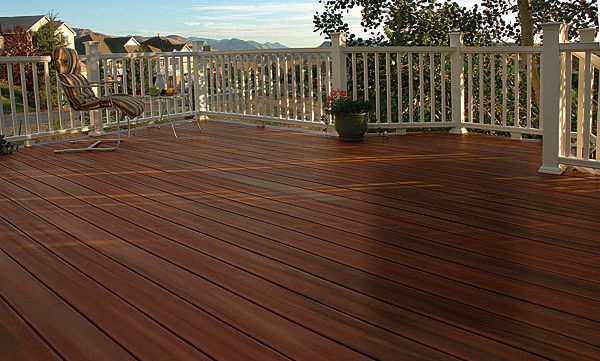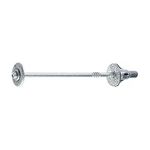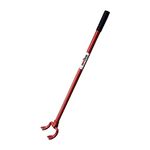Synthetic or Wood Decking?
Synthetic and wood deck planks are durable and good-looking choices, but nothing is maintenance-free.

Synopsis: Considering the abuse heaped on the average deck, it’s worth the time to choose the most durable and long-lasting planks out there. As recently as 2008, almost 85% of all deck boards sold were made from real wood, but that number is expected to drop to 77% by 2011 as man-made decking gains market share. But the battle is far from over. Wood-treatment processes continue to evolve, improving the durability of decking made from trees while addressing concerns about toxicity and hardware corrosion. At the same time, synthetic-decking manufacturers have fine-tuned the look of their products while correcting early problems with fading and decomposition. This article explores the pros and cons of different types of wood and synthetic decking.
You might think deck boards have it easy: endless relaxation, center stage at parties and barbecues, hours spent doing nothing but soaking up the sun. But that would be forgetting the high heels, the scraping lawn chairs, and the energetic retriever dragging his Frisbee. It also would be forgetting how destructive the sun gets hour after hour, its relentless heat and light making even the toughest deck boards fade, twist, cup, check, and try to pull themselves free of the fasteners that hold them to the joists. Never mind the rain and the snow, and the days and the months when everyone goes inside except the deck boards. Or the worst kind of deck party, where the guests include mold and mildew and really, really hungry insects.
Considering the abuse heaped on the average deck, it’s worth the time to choose the most durable and long-lasting planks out there. As recently as 2008, almost 85% of all deck boards sold were made from real wood, but that number is expected to drop to 77% by 2011 as man-made decking gains market share. But the battle is far from over. Wood-treatment processes continue to evolve, improving the durability of decking made from trees while addressing concerns about toxicity and hardware corrosion. At the same time, synthetic-decking manufacturers have fine-tuned the look of their products while correcting early problems with fading and decomposition.
Wood loses its edge, then makes some gains
In California, where the deck craze started more than a half-century ago, redwood was the top choice for decking because it was beautiful, plentiful, and insect- and rot-resistant. As other areas of the country realized how cool it was to hang around outside, green-tinted, pressure-treated yellow pine deck boards were nailed down everywhere. Both woods proved problematic.
Old-growth redwood was in short supply, and conservationists started asking loudly whether it was right to harvest some of the oldest living things on earth just to keep homeowners’ feet out of the crabgrass while they grilled their veggie burgers. Second-growth redwood, though, proved not as durable as the old lumber, mainly due to the amount of sapwood and knots, and an inner heartwood that wasn’t nearly as insect- and weather-resistant. Other naturally durable wood decking, such as cedar and Douglas fir, had similar deficiencies, which required lots of maintenance.
The early wood and plastic composite products looked as much like real wood as a milk jug looks like a cow
Pressure-treating wood wasn’t the perfect answer, either. Early formulas were infused with a carcinogenic cocktail of copper and arsenic that was outlawed in 2004. And while pressure-treating does prevent decay, wetting and drying cycles affect pressure-treated decking just like any wood, causing the boards to cup, check, and splinter. Assorted solutions of liquid deck preservatives — oils, varnishes, and soaps — can slow the effects of insects and weather, but most people want a deck to relax on, not work on.
For more photos and details, click the View PDF button below:
Fine Homebuilding Recommended Products
Fine Homebuilding receives a commission for items purchased through links on this site, including Amazon Associates and other affiliate advertising programs.

FastenMaster Screw Bolt Fastening System

Angel Guard Deck Demon

MicroFoam Nitrile Coated Work Gloves






















